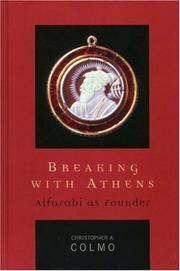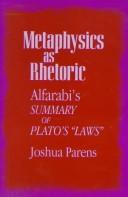| Listing 1 - 10 of 63 | << page >> |
Sort by
|
Book
ISBN: 9780801453809 0801453801 0801456312 0801456320 1501746790 Year: 2015 Publisher: Cornell University Press
Abstract | Keywords | Export | Availability | Bookmark
 Loading...
Loading...Choose an application
- Reference Manager
- EndNote
- RefWorks (Direct export to RefWorks)
"Alfarabi (ca. 870-950) founded the great tradition of Aristotelian/platonic political philosophy in medieval Islamic and Arabic culture. In this second volume of political writings Charles E. Butterworth presents translations of Alfarabi's Political Regime and Summary of Plato's Laws, accompanied by introductions that discuss the background for each work and explore its teaching. In addition, the texts are carefully annotated to aid the reader in following Alfarabi's argument. Arabic-English and English-Arabic glossaries allow interested readers to verify the way particular words are translated. Throughout, Butterworth's method is to translate consistently the same Arabic word by the same English word, rendering Alfarabi's style in an unusually faithful and yet approachable manner. Political Regime consists of two parts. One focuses on nature and natural existing things, as well as the principles beyond nature that guide the existing things. In the second part, the exposition centers on human beings and their place in the larger cosmic whole, as well as on how a proper organization of human life in political association provides the conditions whereby human beings might achieve their purpose."--Jacket.
Islam. --- Politische Philosophie. --- Fārābī.
Book
Year: 1980 Publisher: Erevan : Izdatel'stvo AN Armjanskoj SSR,
Abstract | Keywords | Export | Availability | Bookmark
 Loading...
Loading...Choose an application
- Reference Manager
- EndNote
- RefWorks (Direct export to RefWorks)
Philosophers, Armenian. --- Philosophy --- David, --- Fārābī --- Fárábī --- Criticism and interpretation.

ISBN: 0739110160 Year: 2005 Publisher: Lanham Lexington books
Abstract | Keywords | Export | Availability | Bookmark
 Loading...
Loading...Choose an application
- Reference Manager
- EndNote
- RefWorks (Direct export to RefWorks)

ISBN: 1438415494 9781438415499 0791425738 9780791425732 0791425746 9780791425749 Year: 1995 Publisher: Albany
Abstract | Keywords | Export | Availability | Bookmark
 Loading...
Loading...Choose an application
- Reference Manager
- EndNote
- RefWorks (Direct export to RefWorks)
Plato. --- Fārābī. --- Plato --- Fārābī.
Book
Year: 1947 Publisher: New York : Hobson Book Press,
Abstract | Keywords | Export | Availability | Bookmark
 Loading...
Loading...Choose an application
- Reference Manager
- EndNote
- RefWorks (Direct export to RefWorks)
Book
ISBN: 9780226501871 Year: 2010 Publisher: Chicago (Ill.) : University of Chicago press,
Abstract | Keywords | Export | Availability | Bookmark
 Loading...
Loading...Choose an application
- Reference Manager
- EndNote
- RefWorks (Direct export to RefWorks)
Islamic philosophy. --- Political science --- Philosophy. --- Fārābī.
Book
Year: 1981 Publisher: Napoli : Istituto orientale di Napoli,
Abstract | Keywords | Export | Availability | Bookmark
 Loading...
Loading...Choose an application
- Reference Manager
- EndNote
- RefWorks (Direct export to RefWorks)
Logic --- Early works to 1800. --- Aristotle. --- Fārābī.
Book
Year: 1986 Publisher: Amsterdam North-Holland Publishing Company
Abstract | Keywords | Export | Availability | Bookmark
 Loading...
Loading...Choose an application
- Reference Manager
- EndNote
- RefWorks (Direct export to RefWorks)
Book
ISBN: 9791022500593 Year: 2015 Publisher: Beyrouth : Albouraq,
Abstract | Keywords | Export | Availability | Bookmark
 Loading...
Loading...Choose an application
- Reference Manager
- EndNote
- RefWorks (Direct export to RefWorks)
Book
ISSN: 01698729 ISBN: 9789004206151 9004206159 9786613530509 9004217320 1280126647 9789004217324 9781280126642 Year: 2012 Volume: 85 Publisher: Leiden: Brill,
Abstract | Keywords | Export | Availability | Bookmark
 Loading...
Loading...Choose an application
- Reference Manager
- EndNote
- RefWorks (Direct export to RefWorks)
This study—the first monograph devoted exclusively to al-Fārābī’s cosmology—provides a new interpretation of this thinker’s philosophical development through an analysis of the Greek and Arabic sources and a contextualization of his life and thought in the cultural and intellectual milieu of his time. It discusses key cosmological and metaphysical concepts articulated in his works, with a special focus on celestial causation, intellection, and motion. This book also examines al-Fārābī’s cosmological method and particularly the connection between astronomy, physics, and metaphysics. The result is a reassessment of al-Fārābī’s cosmology vis-à-vis late-antique Greek philosophical trends and a clearer understanding of how it creatively adapted and transformed this legacy to establish a new cosmological paradigm in Arabic thought.
Islamic cosmology --- Cosmology, Islamic --- Muslim cosmology --- Cosmology --- al-Fārābī, Abū-Nasr Muhammad. --- Abū Nasr Muhammed ibn Muhammed ibn Tarhān ibn Uzlag al-Farabi --- Alfarabius --- Alpharabius --- Fārābī --- Muhammed Ibn Muhammed (Abu Nasir) al-Farabi --- Islamic cosmology. --- Fārābī.
| Listing 1 - 10 of 63 | << page >> |
Sort by
|

 Search
Search Feedback
Feedback About UniCat
About UniCat  Help
Help News
News